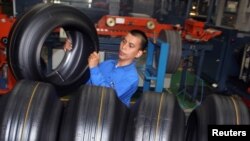Emerging research is showing the toxicity of vehicle tires, which on average contain about 200 components and chemicals, often derived from crude oil.
While critics say tires contain many toxic and carcinogenic chemicals, so far there is only really consensus around one - 6PPD, an antioxidant and antiozonant found in all tires that reduces cracking.
This year, California is expected to be the first authority to demand tire-makers demonstrate they are seeking an alternative to 6PPD - a degraded form of which is lethal to some fish and has been found in human urine in South China.
The European Union's upcoming Euro 7 emission regulations will set standards for tires for the first time.
Compounding those challenges, manufacturers will need to develop tires that emit less for heavy EVs, which Michelin and Goodyear have reported can wear out tires up to 50% faster.
"The unintended consequence of electric cars is we'll have more tire pollution unless we have better tires," said Enso's Erlendsson, whose tires, in testing emit 35% less than premium EV tires from major manufacturers.
He says this is because their reliance on higher-quality, more expensive materials makes them more durable.
Bridgestone and Goodyear declined to discuss the industry's emissions challenges.
But Michelin, Continental and Pirelli told Reuters they are pursuing alternatives to 6PPD, with Michelin and Continental adding collective industry action may be necessary to find solutions.
Asked about Euro 7 regulations, Michelin said it wants worldwide standards to squeeze the higher emitting tires, which are usually cheaper, out of the market. Continental advocates a global abrasion standard with transparent labelling for consumers.
Nick Molden, CEO of British-based testing specialist Emissions Analytics, said the "dirty end" of the list of tires the company has tested are "cheap Chinese imports" common in the European market.
The Chinese makers of Rockblade, Mazzini and Ovation - among the worst-performing tire brands on Molden's list - did not respond to requests for comment.
Data provided to Reuters by Emissions Analytics shows new tires developed so far are unlikely to solve the problem.
For example, while tests carried out on Continental bicycle tires made using dandelions show a 24.5% drop in carcinogenic aromatics - which help cars hug the road - the chemicals in the particles they emit are similarly toxic overall, Molden said.
"They are just differently bad," he added.
California regulators say 6PPD's impact on human health is unclear, but are finalizing documents that could require tire manufacturers to analyze safer alternatives.
The tire industry said finding a replacement for 6PPD is hard because any new chemical must prevent tires degrading and cracking without affecting other attributes.
"Tires are a compromise" between safety, noise, handling and abrasion, said Adam McCarthy, secretary general of the European Tire and Rubber Manufacturing Association.







